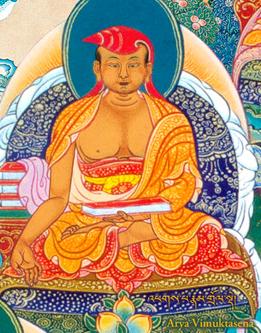Arya Vimuktisena: Difference between revisions
Jump to navigation
Jump to search
mNo edit summary |
No edit summary |
||
| Line 4: | Line 4: | ||
==Further Reading== | ==Further Reading== | ||
*''Abhisamayalamkara with Vritti by Arya Vimuktisena and Aloka by Haribhadra'', translated by Gareth Sparham, 2005 | *''Abhisamayalamkara with Vritti by Arya Vimuktisena and Aloka by Haribhadra'', translated by Gareth Sparham, 2005 | ||
*Lobsang N. Tsonawa, ''Indian Buddhist Pandits from The Jewel Garland of Buddhist History'', Dharamsala: Library of Tibetan Works and Archives, 1985. | |||
[[Category: Historical Masters]] | [[Category: Historical Masters]] | ||
[[Category: Indian Masters]] | |||
[[Category:Seventeen Nalanda Masters]] | [[Category:Seventeen Nalanda Masters]] | ||
Revision as of 22:04, 12 August 2009

Arya Vimuktisena (Tib. Pakpa Namdroldé; wyl. ‘phags pa rnam grol sde) - Vasubandhu had four great disciples who more learned in certain topics than himself. Of these, Arya Vimuktisena was more learned on the topic of the prajnaparamita. Vimuktisena was the nephew of the great master Buddhadasa. He reached the bodhisattva level of Perfect Joy and having received instructions on the prajnaparamita directly from the Buddha, composed his great commentary. His foremost student was Bhante Vimuktisena.
Further Reading
- Abhisamayalamkara with Vritti by Arya Vimuktisena and Aloka by Haribhadra, translated by Gareth Sparham, 2005
- Lobsang N. Tsonawa, Indian Buddhist Pandits from The Jewel Garland of Buddhist History, Dharamsala: Library of Tibetan Works and Archives, 1985.